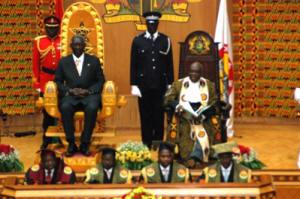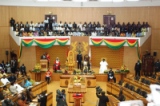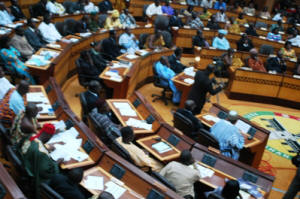| |
 |
|
The
President is ready |
| |
| |
 |
|
The hall of
parliament |
| |
| |
 |
|
MPs in the seats |
| |
| |
| |
| |
| |
| |
|
More pictures |
|
President
Kufuor's state of the nation address
- Full statement
February 7, 2007, Accra Ghana
Mr. Speaker, the Constitution of the Fourth Republic
prescribes that the President of the Republic
delivers to Parliament a message on the state of the
nation at the beginning of each session. This is
what I have come to do.
Mr. Speaker, as I look around the House, I see empty
seats on the Minority’s
side.
It is a sad day that members of that side have
chosen to absent themselves. It is sad again that
they have resorted to this course of action,
apparently in reaction to the judgment of a duly
constituted court of law. It is even sadder that
they seem to ignore the fact that the due process of
going through appeals, as provided for by the
Constitution, is yet to be exhausted, in this
particular case.
Mr. Speaker, I want to use this occasion to ask them
to reconsider their withdrawal from the House and
come back to play their part to uphold the integrity
of the House. I make this appeal in the light of the
sincerity with which government is committed to the
reconciliation process it has initiated for healing
the wounds of the nation and to make for a fresh
start.
Mr. Speaker, let me at this point acknowledge Mr.
Abu Bonsrah, the honourable member for Fomena, who
has taken his seat in the House from the recent
by-election. I wish him a very successful term.
About two weeks ago, our own brother and compatriot,
Mr. Kofi Annan, who has successfully completed two
terms as Secretary-General of the UN returned home
to Ghana to a hero’s welcome. He has since delivered
a thought-provoking lecture which is the first in
the series of the Golden Jubilee Lectures. I am sure
the whole nation joins me in wishing him a happy
return home, after his distinguished service for
humanity.
Mr. Speaker, later, I shall talk about Ghana’s
unanimous election to the Presidency of the African
Union during this very auspicious year. Let me
however thank the many well-wishers from around the
country and beyond for their kind sentiments. The
honour belongs to the entire nation.
INTRODUCTION
Mr. Speaker, when the 2006 budget was read in
November 2005, many thought the practice would be a
nine-day wonder. Happily, the tradition is being
sustained and this year’s budget statement was read
last November. As a result, government’s policies
and financial plans for the year, as contained in
the budget statement, have already been approved by
the House. So, this morning I am addressing:
1. Key challenges within the socio- economy,
2. Issues of good governance, and
3. The on-going Golden Jubilee celebrations and
their aftermath.
GHANA ON THE RISE
Mr. Speaker, my government assumed office in 2001
and had its mandate renewed for a second term in
2004. All too soon, it has reached the mid-point of
this second term. All over the world, this period is
considered critical for governments which are about
to end their tenure, in that, they tend to engage in
dispassionate assessment of their performance with a
view to correcting their mistakes and consolidating
their achievements for the time left. In this
respect, this government is no different.
Propitiously, in our case, this critical mid-term
analysis is coinciding with the Golden Jubilee
Anniversary of Ghana’s Independence, as a sovereign
nation. This reinforces the need for the government
and the entire society to engage in stock-taking and
re-setting of national vision and goals for
advancement. Therefore, I expect subsequent
discussion of this State of the Nation Address to be
conducted in the spirit of candour and sincerity
from all sides.
Happily, Mr. Speaker, the government’s assessment of
the nation’s political, economic and social
conditions of the state indicates that, on balance,
GHANA, THE BLACK STAR OF AFRICA, IS ON THE RISE
AGAIN. This should make all of us nationals happy
about the various contributions and sacrifices we
have made, individually and collectively, to bring
the nation this far. The obvious challenge now is
how to accelerate the development for the betterment
of the entire society. This appreciation should
strengthen our resolve to work together in
overcoming existing problems and drawbacks like:
• The energy crisis that is plaguing industrial and
economic activities.
• The pockets of conflict in the country, arising
mainly from chieftaincy disputes,
• The low salaries, wages, and productivity, with
their attendant high unemployment within the
economy,
• The impact of Globalisation on socio-economic
development programmes.
Mr. Speaker, it is within our power to overcome most
of these challenges in the short to medium term.
This is why we Ghanaians must will ourselves to work
harder than we have ever done in the past 50
years.Fortunately, our path to success is
benchmarked by our national vision of attaining a
middle income status through a growth rate of 8% GDP
annually, which translates to over US$1,000 GDP per
capita income within the next decade.
Happily, this vision also coincides with the
Millennium Development Goals set by the UN to reduce
global poverty by half by 2015. Ghana is therefore
not alone, like a long distance runner in search of
a better life. Our task is made lighter in the
knowledge that there are other nations around the
world being encouraged and assisted by the
international community to move alongside us in the
same direction in overcoming these challenges.
Mr Speaker, within our category of developing
nations, Ghana is being acknowledged as among the
leaders in the pursuit of these goals. Thus
government is determined to consolidate and build on
the achievements made so far, and to turn the
massive tide of goodwill that Ghana is enjoying
worldwide to maximum advantage to facilitate this
undertaking.
ENERGY AND POWER
Mr. Speaker, I shall start my message with a report
on the current crisis in the supply of energy in the
country. I believe this will go a long way in
reducing the anxiety and the fears of the business
community and the public in general.
The problem of inadequate energy supply has crept up
on the nation since the construction of the Akosombo
dam. With it, the whole nation was lulled into
believing that the dam will be an inexhaustible
source of power. The first signs that this belief
was na´ve appeared toward the mid 1980s when the
nation suffered the first load shedding from
Akosombo.
Alas, the economy was in no shape to support any
serious solutions to the problem. There was a
recurrence after the mid 1990s. It was then that
resort was made to thermal plants like Aboadze.
Fuelled by crude oil, these plants proved extremely
costly to run.
On assumption of office in 2001, government decided
to find long-term solutions to this problem.
Accordingly, it initiated action to raise
US$40million, being Ghana’s equity, for commencement
in 2003, of the construction of the West African Gas
Pipeline project. This had been on the drawing board
for many years. The project, which will produce
large volumes of relatively cheaper and sustainable
source of energy, was expected to be operational by
December last year. There has been some
constructional delay and is now programmed to be
operational in August this year.
Mr. Speaker, in anticipation of this flow of gas,
the establishment of gas turbine thermal plants is
being undertaken by public and private agencies.
In the interim, government has taken short to medium
term measures to put an end to the embarrassing and
expensive load shedding to which society and
industry have been subjected to over the past six
months. These measures include supply from the West
Africa Power Pool arrangement whereby, within the
next fortnight, Ghana will benefit from supplies
from Nigeria and Cote D’Ivoire to the tune of 200
megawatts.
The Volta River Authority is poised to establish a
300 megawatt plant in Tema.
The same company is building another emergency plant
to supply 126 megawatts of power by August this
year.
The Osagyefo Power barge which has been standing
idle will be empowered to produce 120 megawatts.
A private sector Ghanaian-Chinese joint venture
company is in the offing to produce, in two phases,
up to 600 megawatts of power.
Government has also contracted three American
companies to produce up to 110 megawatts by the end
of April.
This arrangement would altogether provide at least
500 megawatts which is far in excess of the present
shortfall.
I should acknowledge at this point, the consortium
of mining companies which has offered to build a
plant at Tema, to be completed by June, to supply 80
megawatts of power.
Mr. Speaker, additional to these ventures,
government has initiated action to build another
hydro-electric dam, the Bui dam. As we speak there
is a high powered delegation in China to sign an
agreement with the Chinese Exim bank for assistance
towards the construction of this dam which is
designed to generate 400 megawatts of electricity.
So, Mr. Speaker, government has not been remiss in
its responsibilities. On the contrary, it has taken
steps to give both short and long term solutions to
the problem. Within five years, the energy level
will be doubled in capacity to cater for the
industrial and economic requirements for the next 20
years.
Mr. Speaker, I should add that research is on-going
to find alternative sources like solar, wind as well
as biological plants like the jetropha whose seed is
used to produce diesel oil.
Mr. Speaker, I should use this occasion to appeal
once again to our entire society to be economical in
the use of electrical appliances and also conserve
energy within public offices and installations.
ECONOMIC PERFORMANCE
Mr. Speaker, despite the perennial problems of the
energy sector, including the highest price ever of
crude oil last year, this nation has registered very
impressive achievements during the past six years in
the management of its macro-economy.
Counting on the support and goodwill of Ghanaians,
government has implemented various policies and
programmes which have enabled it to transform the
macro economy from years of stagnation to the
current growth rate of 6.2%. From 40.5% in 2000,
inflation now stands at 10.2%; while the commercial
banks’ lending rate which stood at over 50% five
years ago is now around 20% and is still falling.
The Cedi has stabilised and maintained its value
against major currencies, thus encouraging the Bank
of Ghana to initiate a process, starting from next
July, towards its re-denomination. This is to make
accounting procedures and monetary transactions less
cumbersome for everyone and, also, to reduce the
cost of printing money, or the burden of carrying
huge amounts of money around.
Mr. Speaker, this outstanding performance of the
macro-economy is boosting the confidence of both
domestic and foreign investors, which is already on
the upsurge. Ghanaians no longer feel the need to
transfer their money abroad nor change it into
foreign currency to preserve its value. Further, all
over the country, there is evidence of vigorous
construction work which must be taken as a sign of a
growing economy.
Another manifestation of confidence is in increased
remittances from Ghanaians living abroad, which
totalled over US$4 billion last year.
On the financial front, 4 new banks, Guaranty Trust,
Fidelity, Zenith and Intercontinental, have been
established within the past 2 years.
Meanwhile, the bill for the establishment of an
International Financial Services Centre, a
partnership between the Government of Ghana and the
Barclays Bank, is ready to be placed before
Parliament. This is to further the policy of making
Ghana an international financial hub. I encourage
Honourable Members to give the bill the necessary
backing.
In the case of the mining sector, I am happy to
announce that I commissioned the operation of
Newmont Gold mine at Kenyasi in the Brong Ahafo
Region. It has already poured its first gold.
Barry Callebaut Ghana has also installed a new
multi-million dollar processing line to expand its
product range.
In the mean time, Cargill International, a global
agro-processing company has started the construction
of a new Cocoa Processing Facility in Tema, which
involves over US$50 million in new investments.
Golden Exotic Company is the local subsidiary of the
world renowned Compagnie Fruitiere of France. It
started its operations in the country in 2003. From
a first export of 3,600 metric tonnes of pineapples
in 2005, the Company projects to export 17,000
metric tonnes this year. Such is the high
performance which investors are now recording within
our economy.
Mr. Speaker, in addition to such well-organised
Private Sector companies, there is a host of others
within the informal section of the sector whose
potential is yet to be fully developed. Government
will continue to direct various policies and
measures to identify them, to assist them raise
their production level and create more job
opportunities, using micro as well as small and
medium credit lines. This will not only improve
their business, but also, help widen the tax net.
PUBLIC SECTOR REFORMS
Mr. Speaker, last year, I appointed a Minister to
oversee the critical reforms needed in the Public
Sector. The reforms are to rationalize operations in
the sector, enhance the capacity of both the
agencies and their staff and restore discipline and
pride.
A well functioning public sector should also become
more supportive of the Private Sector, in the spirit
of Public- Private Sector Partnership, which should
be the cornerstone for the acceleration of
socio-economic development.
Last year, government adopted a new wage reform
policy to set up a framework to ensure equal pay for
work of equal value across the spectrum of the
Public Sector. To operate, this new policy, a Fair
Wages Commission has been set up to rationalize the
entire sector’s salaries by removing distortions
which, in the past caused confusion and disaffection
among Public Servants.
The exercise which was preceded by salaries across
the Board in this year’s budget has put a strain on
government’s financial targets. Government however
sees the increases as necessary investments to
inspire public servants and change their mindset
towards higher productivity.
HUMAN RESOURCE DEVELOPMENT
Mr. Speaker, in pursuit of the policy of Human
Resource Development, the government is embarking on
ambitious schemes in capacity building, skills
acquisition, vocational training and application of
science and technology. The centre-piece of this
policy is the New Educational Reform to be launched
in September, this year.
Already, following the introduction of measures like
the Capitation Grant, School Feeding Programme, and
School Bussing Programme, great strides have been
made in school enrolments. It is expected that by
2015 Ghana would have reached 100% enrolment.
SECONDARY EDUCATION
At the secondary level, during the year, Government
will commission the first batch of model Secondary
Schools, numbering thirty-one (31), that have had
their facilities upgraded. Contracts for the second
phase of the upgrading programme, involving
twenty-five (25) schools, have also been awarded;
and construction has begun in many places.
TECHNICAL AND VOCATIONAL EDUCATION
Mr. Speaker, the same attention is being given to
technical and vocational education. Government is
embarking on an accelerated programme of
construction, rehabilitation and equipping of
technical and vocational institutes, and
polytechnics throughout the country.
 |








